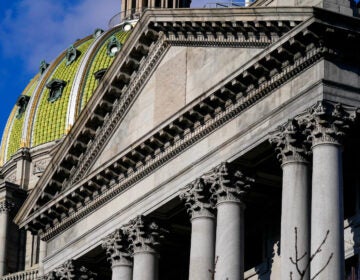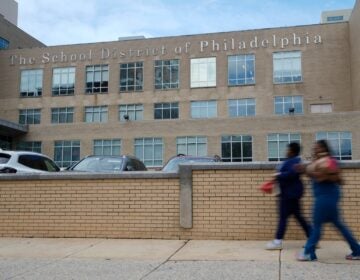Funding to address educational disparities in Pennsylvania has worked, advocates say
Many schools were underfunded for years, the Commonwealth Court ruled in 2023. The response has been promising, say those who have measured impacts.
Listen 1:18
The state house floor inside the Capital building in Harrisburg, Pa. (Kimberly Paynter/WHYY)
From Philly and the Pa. suburbs to South Jersey and Delaware, what would you like WHYY News to cover? Let us know!
Advocates say the $526 million that Gov. Josh Shapiro has proposed in his 2025-2026 budget to address the chronic underfunding of Pennsylvania’s most disadvantaged school districts is a much-needed down payment in addressing decades of neglect.
The funding is a consequence of a 2023 ruling by the Commonwealth Court that the state’s education funding formula was unconstitutional. The Basic Education Commission calculated that the amount of underfunding was $4.5 billion.
The governor’s 2024-2025 budget included $1.1 billion for public education, with $494 million explicitly identified to address the funding disparity (what’s called “adequacy funding”) and directed to 300 school districts that needed it the most.
“It was a budget that began to address the judge’s decision,” said Deborah Gordon Klehr, executive director of the Education Law Center in Philadelphia (ELC). “It recognized an adequacy gap, calculated it and calculated the state’s share at $4.5 billion and allocated $500 million towards filling that gap. We called it a start — that’s 11% of the state’s share needed to provide an adequate education to students.”
Meanwhile, some Republican legislators have argued for more transparency in spending public education dollars.
In May, state Rep. Jason Ortitay, R-46th District, introduced House Bill 1448, which would create a Financial Transparency Data and Reporting System for education spending that would allow legislators, school officials and state agencies to track how funds are spent and whether it is useful for students.
Manuel Bonder, a spokesperson for Shapiro, said the governor is seeking compromise.
“The governor has made it clear repeatedly he is focused on working together with leaders in both parties and both chambers to deliver a budget that delivers for families all across Pennsylvania,” Bonder said. “At the center of that, of course, is funding for education — funding for our schools.”
The deadline for a new budget is June 30, when the fiscal year ends, though negotiations in the past have gone into July.
With the subsequent funding increase in the governor’s two previous budgets since the court’s decision in 2023, progress is being made, Bonder said.
“When it comes to education, we are seeing a lot of progress in the schools this year, we are seeing test scores and grades going up, truancy going down, so many markers of progress and success that we want to keep building on,” Bonder said. “The governor is going to keep working in order to deliver these key investments alongside Democrats and Republicans in order to create more opportunities for students and families to build a better future.’’
This fiscal year, Shapiro’s budget calls for a $75 million increase in basic education spending, and a $40 million increase in special education funding. Also, the budget includes cyber charter school reform that would create a statewide base cyber charter school tuition rate of $8,000 a year, to be more in line with the expenses of providing online education, according to the governor’s office. This reform is expected to save about $378 million, it said.
On Wednesday, the Philadelphia Federal of Teachers (PFT) traveled to the state capitol in Harrisburg with officials from the Philadelphia School District and its board to advocate for the passage of Shapiro’s budget.
School Superintendent Tony Watlington Sr. said the budget would translate into an additional $202 million for the school district, compared with the previous year.
In the previous fiscal year, the Philadelphia school district’s share of the adequacy funding was $136.7 million. A significant portion of that money – $63.32 million — allowed the district to retain positions, such as teachers, counselors and support staff, according to a survey commissioned by ELC Law. The district is the largest in the state.
In Bucks County, the Bensalem Township School District said it used $1.43 million in adequacy funds to create a full-day kindergarten program. The money covered teacher salaries and benefits. Also, $322,000 offset charter school costs, according to the survey.
In Berks County, the Muhlenberg School received $2 million in adequacy dollars. Of that total, $407,000 was spent on a core curriculum for math and also for salaries and benefits for elementary staff, the ELC survey stated.
“I think it’s important to note with the increased funds that districts received both through the adequacy allocation and the basic funding increase and special education funding increase in last year’s budget, it has made a difference,” Klehr said. “Maybe for one district it was the ability to hire a reading specialist, maybe in another it was enough to provide art more than once a week.”
The budget negotiations come at a time of threatened cuts by the federal government in public funding for special education students, those living in poverty and multilingual students who are learning English, she said.
“The long-term effects and the short-term effects of not receiving those dollars would be devastating,” Klehr said.

Get daily updates from WHYY News!
WHYY is your source for fact-based, in-depth journalism and information. As a nonprofit organization, we rely on financial support from readers like you. Please give today.







